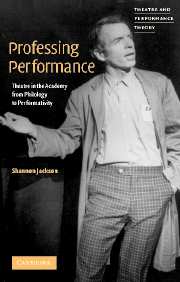Book contents
- Frontmatter
- Contents
- Acknowledgments
- 1 Discipline and performance: genealogy and discontinuity
- 2 Institutions and performance: professing performance in the early twentieth century
- 3 Culture and performance: structures of dramatic feeling
- 4 Practice and performance: modernist paradoxes and literalist legacies
- 5 History and performance: blurred genres and the particularizing of the past
- 6 Identity and performance: racial performativity and anti-racist theatre
- Notes
- Select bibliography
- Index
3 - Culture and performance: structures of dramatic feeling
Published online by Cambridge University Press: 30 March 2010
- Frontmatter
- Contents
- Acknowledgments
- 1 Discipline and performance: genealogy and discontinuity
- 2 Institutions and performance: professing performance in the early twentieth century
- 3 Culture and performance: structures of dramatic feeling
- 4 Practice and performance: modernist paradoxes and literalist legacies
- 5 History and performance: blurred genres and the particularizing of the past
- 6 Identity and performance: racial performativity and anti-racist theatre
- Notes
- Select bibliography
- Index
Summary
The lack of communication with other disciplines gives the drama a peculiar insularity.
Robert BrusteinI learned something from analyzing drama which seemed to me effective not only as a way of seeing certain aspects of society but as a way of getting through to some of the fundamental conventions which we group as society itself. These, in their turn, make some of the problems of drama quite newly active.
Raymond WilliamsPerforming cultural studies
My first epigraph is taken from an essay entitled, “Why American Plays Are Not Literature,” in which Robert Brustein chastised “the drama” for not being interdisciplinary. As the title suggests, Brustein made it clear that something called “literature” was the discipline with which drama most needed contact. Not only was it, in Brustein's view, the only discipline with which the drama needed contact, but its models of value were those to which all drama should aspire. Condemning the fact that American dramatists almost never sought representation in “the literary periodicals,” his 1959 use of the term interdisciplinary was thus away of rationalizing a formula for the cultural legitimation of the drama, American and otherwise. My second epigraph is from a drama scholar who was Brustein's contemporary if also, at some level, his antithesis. Before and between renowned texts such as Culture and Society and Keywords, Williams published a series of books in the field of drama – Drama from Ibsen to Eliot, Drama in Use, Modern Tragedy, and a revised Drama from Ibsen to Brecht – a “set” that he considered a formative “critical study” of the dramatic form.
- Type
- Chapter
- Information
- Professing PerformanceTheatre in the Academy from Philology to Performativity, pp. 79 - 108Publisher: Cambridge University PressPrint publication year: 2004



